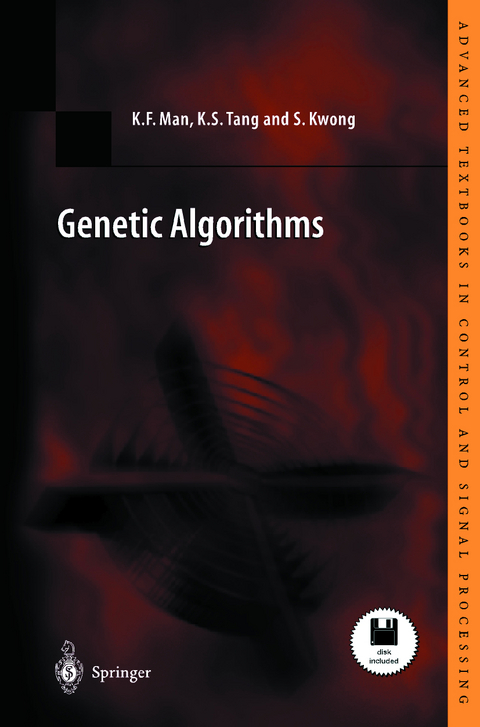
Genetic Algorithms
Springer London Ltd (Verlag)
978-1-85233-072-9 (ISBN)
Genetic Algorithms (GA) as a tool for a search and optimizing methodology has now reached a mature stage. It has found many useful applications in both the scientific and engineering arenas. The main reason for this success is undoubtedly due to the advances that have been made in solid-state microelectronics fabrication that have, in turn, led to the proliferation of widely available, low cost, and speedy computers. The GA works on the Darwinian principle of natural selection for which the noted English philosopher, Herbert Spencer coined the phrase "Survival of the fittest". As a numerical optimizer, the solutions obtained by the GA are not mathematically oriented. Instead, GA possesses an intrinsic flexibility and the freedom to choose desirable optima according to design specifications. Whether the criteria of concern be nonlinear, constrained, discrete, multimodal, or NP hard, the GA is entirely equal to the challenge. In fact, because of the uniqueness of the evolutionary process and the gene structure of a chromosome, the GA processing mechanism can take the form ofparallelism and multiobjective. These provide an extra dimension for solutions where other techniques may have failed completely. It is, therefore, the aim ofthis booktogather together relevant GA materialthat has already been used and demonstrated in various engineering disciplines.
1. Introduction, Background and Biological Inspiration.- 1.1 Biological Background.- 1.2 Conventional Genetic Algorithm.- 1.3 Theory and Hypothesis.- 1.4 A Simple Example.- 2. Modifications to Genetic Algorithms.- 2.1 Chromosome Representation.- 2.2 Objective and Fitness Functions.- 2.3 Selection Methods.- 2.4 Genetic Operations.- 2.5 Replacement Scheme.- 2.6 A Game of Genetic Creatures.- 2.7 Chromosome Representation.- 2.8 Fitness Function.- 2.9 Genetic Operation.- 2.10 Demo and Run.- 3. Intrinsic Characteristics.- 3.1 Parallel Genetic Algorithm.- 3.2 Multiple Objective.- 3.3 Robustness.- 3.4 Multimodal.- 3.5 Constraints.- 4. Hierarchical Genetic Algorithm.- 4.1 Biological Inspiration.- 4.2 Hierarchical Chromosome Formulation.- 4.3 Genetic Operations.- 4.4 Multiple Objective Approach.- 5. Genetic Algorithms in Filtering.- 5.1 Digital IIR Filter Design.- 5.2 Time Delay Estimation.- 5.3 Active Noise Control.- 6. Genetic Algorithms in H-infinity Control.- 6.1 A Mixed Optimization Design Approach.- 7. Hierarchical Genetic Algorithms in Computational Intelligence.- 7.1 Neural Networks.- 7.2 Fuzzy Logic.- 8. Genetic Algorithms in Speech Recognition Systems.- 8.1 Background of Speech Recognition Systems.- 8.2 Block Diagram of a Speech Recognition System.- 8.3 Dynamic Time Warping.- 8.4 Genetic Time Warping Algorithm (GTW).- 8.5 Hidden Markov Model using Genetic Algorithms.- 8.6 A Multiprocessor System for Parallel Genetic Algorithms.- 8.7 Global GA for Parallel GA-DTW and PGA-HMM.- 8.8 Summary.- 9. Genetic Algorithms in Production Planning and Scheduling Problems.- 9.1 Background of Manufacturing Systems.- 9.2 ETPSP Scheme.- 9.3 Chromosome Configuration.- 9.4 GA Application for ETPSP.- 9.5 Concluding Remarks.- 10. Genetic Algorithms in Communication Systems.- 10.1 Virtual Path Design in ATM.- 10.2 Mesh Communication Network Design.- 10.3 Wireles Local Area Network Design.- Appendix A.- Appendix B.- Appendix C.- Appendix D.- Appendix E.- Appendix F.- References.
From the reviews:
This superb book is suitable for readers from a wide range of disciplines.
Assembly Automation 20 (2000) 86
This is a well-written engineering textbook. Genetic algorithms are properly explained and well motivated. The engineering examples illustrate the power of application of genetic algorithms.
Journal of the American Statistical Association March (2002) 366 (Reviewer: William F. Fulkerson)
The book is a good contribution to the genetic algorithm area from an applied point of view. It should be read by engineers, undergraduate or postgraduate students and researchers.
International Journal of Adaptive Control and Signal Processing 19 (2005) 59 – 62 (Reviewer: Doris Saez)
| Erscheint lt. Verlag | 19.2.2001 |
|---|---|
| Reihe/Serie | Advanced Textbooks in Control and Signal Processing |
| Zusatzinfo | 94 Illustrations, black and white; XII, 344 p. 94 illus. With online files/update. |
| Verlagsort | England |
| Sprache | englisch |
| Maße | 155 x 235 mm |
| Themenwelt | Informatik ► Theorie / Studium ► Künstliche Intelligenz / Robotik |
| Mathematik / Informatik ► Mathematik ► Angewandte Mathematik | |
| Technik ► Elektrotechnik / Energietechnik | |
| Technik ► Maschinenbau | |
| Schlagworte | communications • Control • Control Applications • control engineering • filtering • Genetic algorithms • Multiobjective Optimization • Parallelism • Production Planning • Robust Control • Signal Processing • Speech Recognition • System Modeling |
| ISBN-10 | 1-85233-072-4 / 1852330724 |
| ISBN-13 | 978-1-85233-072-9 / 9781852330729 |
| Zustand | Neuware |
| Informationen gemäß Produktsicherheitsverordnung (GPSR) | |
| Haben Sie eine Frage zum Produkt? |
aus dem Bereich


